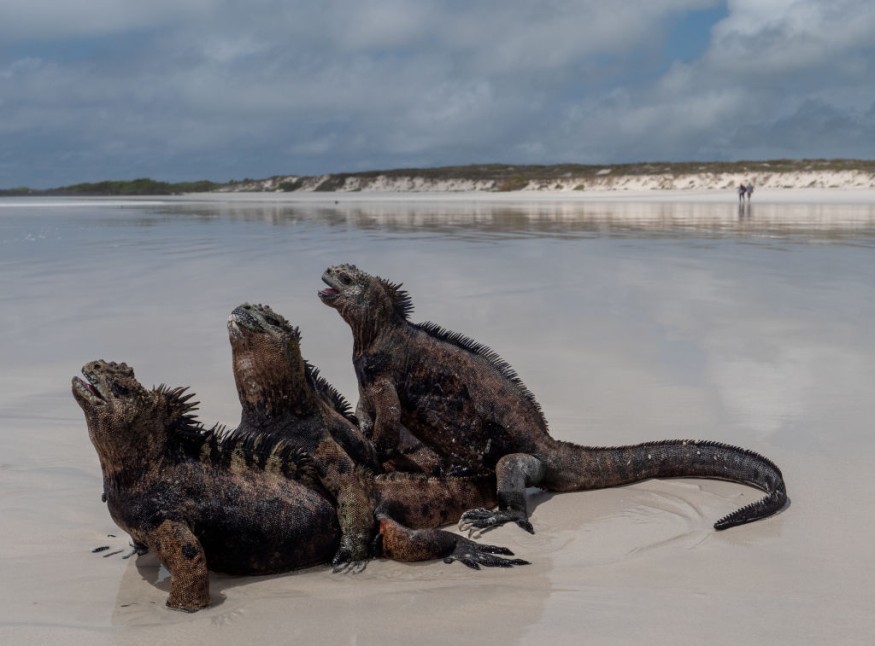Researchers of a new study recently reported that ecotourists who feed grapes to rock iguanas on the Bahamas' remote islands have given them a sweet tooth and high blood sugar, a caution about unknown impacts on the vulnerable reptiles' health.
As indicated in the Nature journal, Northern Bahamian rock iguanas that live on the Exuma Islands "are hooked on the tasty tourist treats" that they're rushing to the beaches when hearing boats approaching.
Tourists’ sweet treats threaten rare iguanas’ health https://t.co/mYkZDVlEVT
— nature (@Nature) April 22, 2022
According to the United States-based John G Shedd Aquarium's Charles Kapp, for a tour operator, it was an excellent way to guarantee that one would be able to see such animals, and humans would have these close and personal interactions.
Essentially, conservationists had already begun to become concerned that the non-native fruit given to the iguanas on the end of skewers, was making the big lizards less wary of humans and possibly susceptible to smugglers for the pet trade.
Nonetheless, those closely involved with the creatures started to suspect the diets caused more of an upset. The hint was in the animals' poo.
Read Also : Baby Dragons Found? How to Train These Red-Eyed Creatures as Pet and Everything You Need to Know

A Taste for Grapes
A rock iguana in Northern Bahamas in particular, which eats the leaves and fruiting plants that nature intended has feces that Susannah French, a scientist from Utah State University, compares with a "Cuban cigar, a bunch of rolled-up leaves."
A similar Breibart News report said that the excretions of those that developed a taste for the grapes of the tourists are a "watery mess."
That prompted the scientists to look into the effects of these sugar-packed diets on the bodies of the iguanas. Their research first looked in the lab at the effects of a high-sugar diet on common green iguanas.
Describing their work, French said they are able to then basically deliver sugar over time to simulate the said iguanas' sort o intake "in the field we're getting." As a result, they discovered that the animals struggled to control their blood sugar levels.
A Dangerous Habit
A Phys.org report said that the scientists next traveled to the Bahamas and captured 46 iguanas in all, on fur islands, half from populations often visited by tourists, and the other half from more remote and sheltered outcrops.
Each of the iguanas was fed a glucose drink and researchers then observed their blood sugar for almost one day.
They discovered that those on the islands visited by tourists had the highest glucose peaks, with some staying high for hours, while those that never saw humans saw a rise in levels at a slower race and went back to normal more rapidly.
Whereas the scientists concluded that the sugary feeding regime impacts iguanas physically, they don't know yet how it might affect their health.
Iguanas Provided with Inappropriate Snacks
The study authors looked a well, at how losing their appetite for their normal grazing of local plants might impact the wider environment on the island.
Essentially, the iguanas are by no means, the lone species affected by well-meaning tourists who packed the inappropriate snacks.
According to Kapp, conservationists are acknowledging the essentiality of tourism for the Bahamas and said tour operators had shown willingness to develop their tactics, switching from bread to grapes to prevent harming the iguanas.
He also said they do not want to try to require a total stoppage as they're only trying to provide the information that they can utilize to help in the development of a plant that is probably more sustainable.
Related information about the iguana diet is shown on Steely33's YouTube video below:
Check out more news and information on Lizards in Science Times.
© 2026 ScienceTimes.com All rights reserved. Do not reproduce without permission. The window to the world of Science Times.











